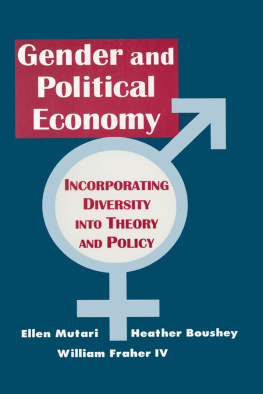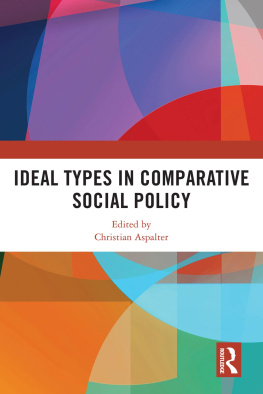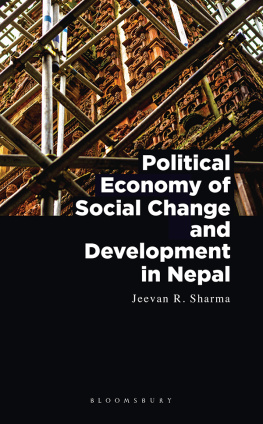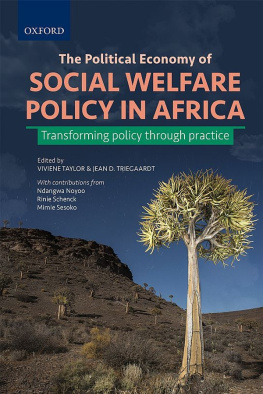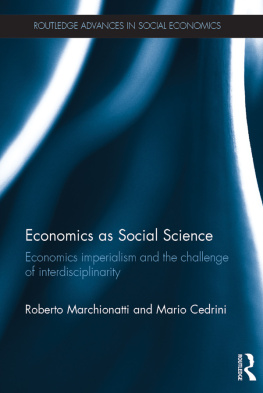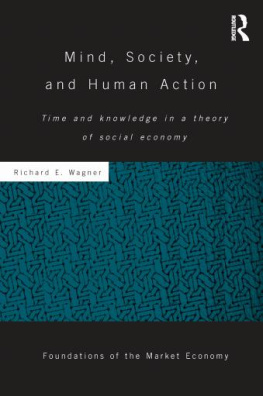Political Economy
A COMPARATIVE APPROACH
Third Edition
Barry Clark

Copyright 2016 by Barry Clark
All rights reserved. No part of this publication may be reproduced, stored in a retrieval system, or transmitted, in any form or by any means, electronic, mechanical, photocopying, recording, or otherwise, except for the inclusion of brief quotations in a review, without prior permission in writing from the publisher.
Library of Congress Cataloging-in-Publication Data
Names: Clark, Barry Stewart, 1948 author.
Title: Political economy : a comparative approach / Barry Clark.
Description: 3rd edition. | Santa Barbara, California : Praeger, [2016] | Includes bibliographical references and index.
Identifiers: LCCN 2015044996 | ISBN 9781440842726 (hardcover : alk. paper) | ISBN 9781440843266 (ebook) | ISBN 9781440843433 (pbk. : alk. paper)
Subjects: LCSH: Comparative economics.
Classification: LCC HB90 .C52 2016 | DDC 330dc23
LC record available at http://lccn.loc.gov/2015044996
ISBN: 978-1-4408-4272-6 (hardcover)
ISBN: 978-1-4408-4343-3 (paperback)
EISBN: 978-1-4408-4326-6
20 19 18 17 16 1 2 3 4 5
This book is also available on the World Wide Web as an eBook.
Visit www.abc-clio.com for details.
Praeger
An Imprint of ABC-CLIO, LLC
ABC-CLIO, LLC
130 Cremona Drive, P.O. Box 1911
Santa Barbara, California 93116-1911
This book is printed on acid-free paper 
Manufactured in the United States of America
Contents
Introduction
Political economy was the original social science. Theorists such as Adam Smith, John Stuart Mill, and Karl Marx developed broad visions of the social system. Not until the latter half of the 19th century did political economy splinter into economics, political science, sociology, social history, social psychology, and social philosophy. The motives for this reorientation were mixed. By partitioning the study of human behavior and society into narrower subdisciplines, social scientists hoped to emulate the analytical power and precision of the natural sciences. However, ideological motives also played a role in the disintegration of political economy. The all-encompassing visions of Smith, Mill, and Marx revealed conflict and tension in society. As political resistance to free markets mounted in the mid-19th century, social scientists hoped to resolve divisive political issues by adhering to logic and factual data to establish a body of knowledge from which public policy could be derived.
Proponents of each of the new social sciences recognized the importance of defining the scope and method of their discipline to establish clearly demarcated boundaries. As the most immediate heir to the legacy of political economy, economics held the greatest potential for emulating natural science because its scope was confined to behaviors most amenable to observation and measurement. The political, social, cultural, historical, and psychological dimensions of human existence were relegated to other disciplines, while economists focused on the individual pursuit of material well-being in the market. The assumption of individual rationality and the use of money as a yardstick for measuring cause and effect enabled economists to construct an impressive body of theory.
Yet, modern economics often elicits skepticism from the general public and from other social scientists. Criticism is directed toward its simplistic assumptions about human behavior, its focus on material and pecuniary interests, its blindness to social relationships, and its esoteric jargon, graphs, and mathematics. Simultaneously, many social scientists tacitly proclaim their admiration of economics as they increasingly borrow concepts, theories, and methods of analysis from the so-called dismal science.
These conflicting attitudes are evident even among economists. On one hand, economics has been labeled the queen of the social sciences, and economists have extended their scope of analysis to include issues ranging from government and law to marriage and family life. Yet, underlying this hubris is a caldron of internal dissension. In addition to the expected attacks by heterodox economists, various Nobel Prize winners and respected scholars have expressed qualms about the direction in which modern economics is moving. The focus on mathematics and theoretical rigor, they charge, has rendered much of contemporary economics irrelevant to real-world issues, as revealed by the fact that most of the economics profession failed to foresee the financial collapse of 2008 and the ensuing Great Recession. Despite the increasing elegance of economists models and statistical techniques, consensus on how to resolve key social issues remains as elusive as ever. A question arises, how can a discipline in such internal disarray merit emulation by other social scientists?
The answer to this paradox lies in the allure of science. Scientific analysis carries tremendous weight in settling intellectual disputes and formulating public policy. In the social sciences, the quality of scholarship is often judged by its resemblance to the physical sciences, and no other social science has been able to match the rigor and elegance of economic theory. Economists have been successful in large part because their simplistic assumptions and narrow focus permit them to borrow mathematical techniques from the physical sciences.
Historians, political scientists, sociologists, and psychologists have been unable to achieve a single scientific paradigm within their respective disciplines. Economists, however, formed such a consensus from the 1950s to the early 1970s, and their advocacy of Keynesian policies propelled them into positions of influence at the highest levels of government. Yet, the breakdown of the Keynesian consensus during the 1970s and economists inability to converge on a new paradigm have diminished the scientific status of economics even as other social scientists increasingly rely on its reputed scientific models and methods.
The quest for a science of economics has not been futile. The sophistication with which empirical data are gathered and analyzed, the construction of elaborate macroeconomic models, and the application of microeconomic theory to decision making have all been impressive. Yet, the public image of economics remains clouded. If economists are indeed scientists, then citizens expect the same expertise and objectivity exhibited by engineers or medical professionals. When economists pronounce widely divergent assessments, forecasts, and policy prescriptions, public reaction ranges from skepticism to disdain. However, economists disagree not because they are incompetent but because they are humans who embody the conflicting values present in modern societies.
The claim that value judgments underlie economics does not necessarily imply that economists consciously seek to advance their personal visions of the good society. For the most part, economists are committed to scientific research in which the facts are permitted to speak for themselves. However, values enter into economics even before research commences. Values affect the choice of issues to be investigated, the theoretical concepts to be used, and the selection of variables to be measured. Although the scientific method of controlled experimentation is designed to keep values out of research, this method has limited applicability in economics, where the laboratory is human society with its complex interaction of innumerable and often unmeasurable variables.
Next page







